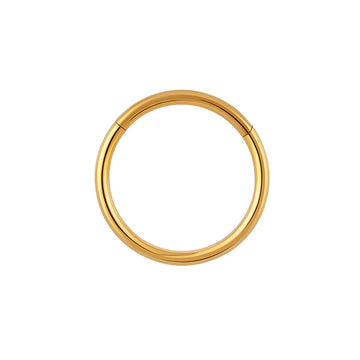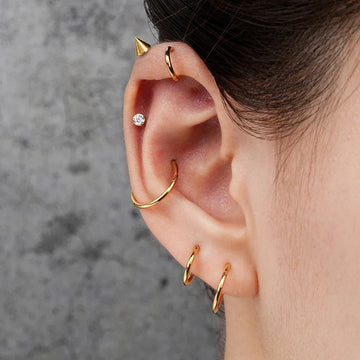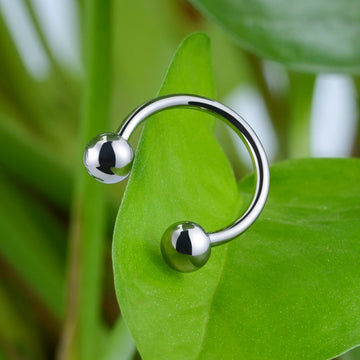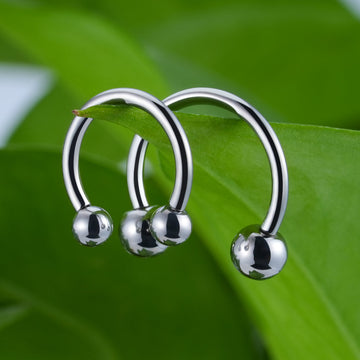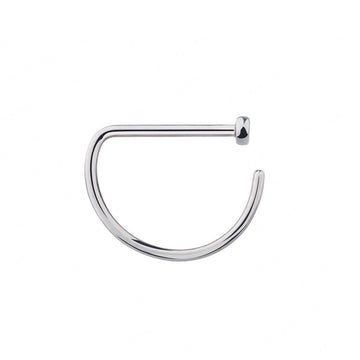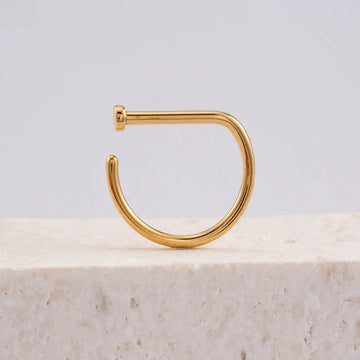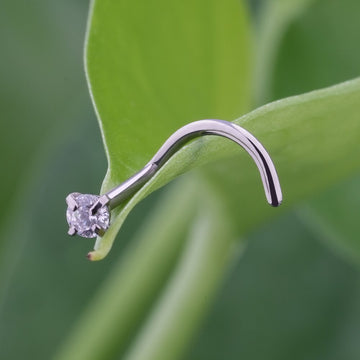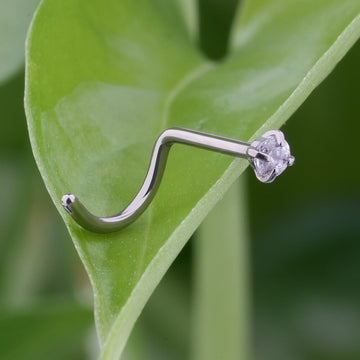Nose Ring Sizes: A Guide to Finding the Right Measure
Sep 17, 2025
If you're planning on getting your nose pierced, you may already have an exact piercing type in mind. But if you're new to piercing, you might not realize just how many sizes (and types) of nose piercings are out there! Here's how to select your nose ring sizes.
Standard Nose Ring Sizes in Brief
- Gauge: 18 gauge (1 mm), 20 gauge (0.8 mm);
- Diameter: 8mm (5/16"), 10mm (3/8");
- Length: 6mm (1/4").
The most common nose ring gauge sizes are 18 gauge (1 mm) and 20 gauge (0.8 mm). However, piercers will often use a slightly larger needle (about 16 gauge/1.2 mm) to make healing easier. The larger hole allows for some swelling and prevents the healing from getting too tight as it heals.
The standard nose ring diameter sizes are 8 mm (5/16") and 10 mm (3/8"). A too-small ring can become uncomfortable or not fit at all. A larger ring might look overly bulky or run the risk of getting caught on clothing, etc.
It may be helpful to know that the average length for a nose stud is 6mm (1/4"). If your nasal cartilage is a little thinner, you might do best with a 5mm stud. If you have thicker nasal cartilage, you might prefer a 7mm stud.
Different Nose Ring Sizes for Different Nose Piercings
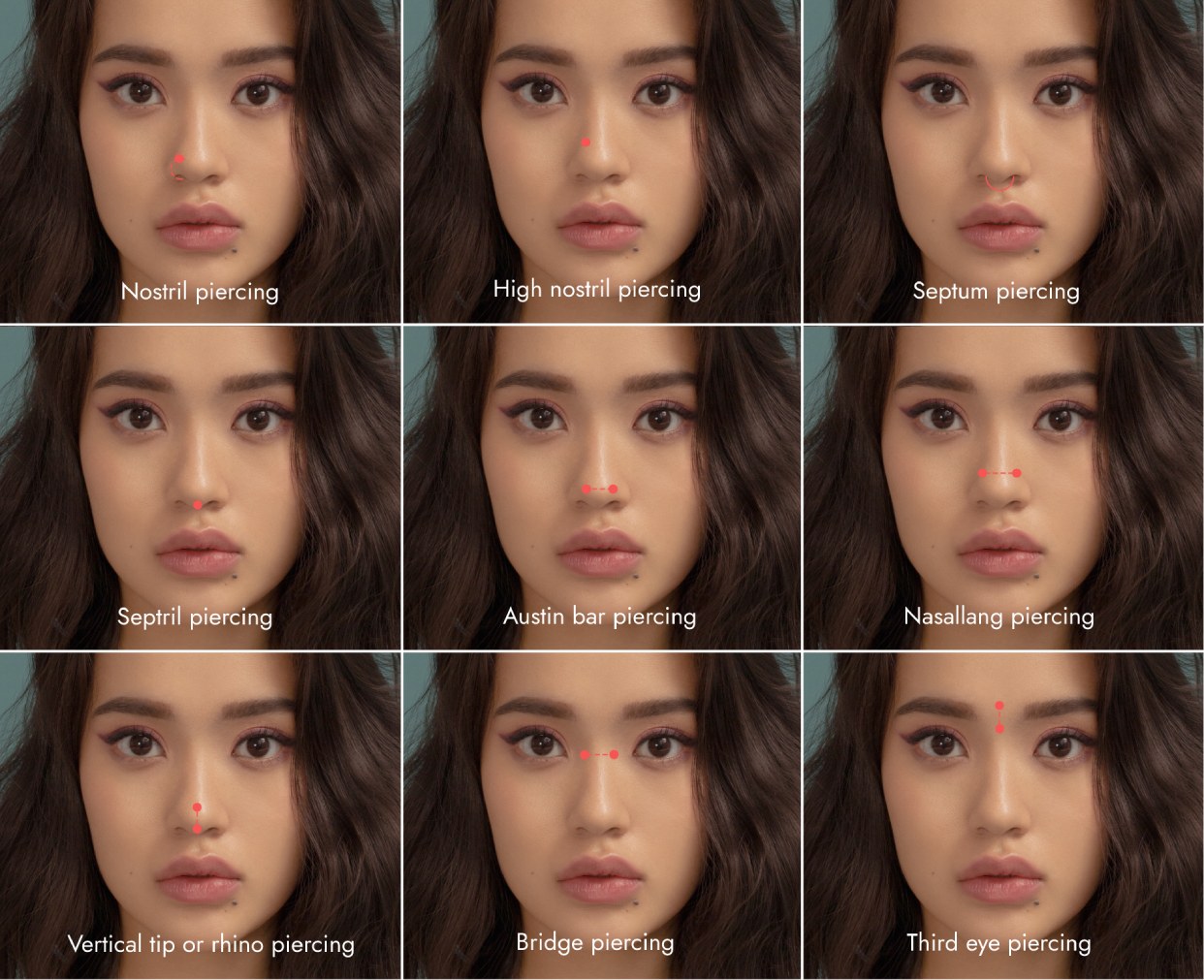
There are nine main types of nose piercings. Here they are, along with the gauges they commonly use:
1. Nostril Piercing.
This is probably the most common nose piercing. It goes through the top part of the nostril. It's typically 18 gauge (1 mm), though some people might opt for the slightly thinner 20 gauge (0.8 mm) after the piercing heals.
2. High Nostril.
This rare piercing looks like a Nostril piercing but is placed higher up the bridge of your nose. It can be quite painful, so most use a relatively thin 18-gauge needle.
3. Septum.
This piercing goes right in front of the septum cartilage. It's somewhat common, and some people call it a "bull" piercing because it looks like the ring through a bull's nose.
Septum rings are typically 16 gauge (1.2mm), though you may sometimes see them done as 18 gauge (1.0mm) piercings. The standard Septum piercing size is 8 mm (5/16") for diameter.
- A Complete Guide: Septum Piercing Price, Pain, Healing, Jewelry, Sizes, Aftercare…
- Septum Ring Sizes: What Gauge Is a Septum Piercing?
4. Septril.
This complex piercing involves first getting a Septum piercing. That piercing is gradually stretched (ideally by a skilled piercer). After this, a smaller needle goes through the cartilage between the nostrils. The end result is a piercing that sits right between your nostrils.
For this one, the initial septum piercing will be 14-16 gauge (1.6mm-1.2mm), and the final part will usually be 18 gauge (1.0mm) or 20 gauge (0.8mm). The most common lengths for studs and barbells worn in the Septril nose piercing are between 5-12mm (3/16''-1/2").
5. Austin Bar.
This unusual piercing is named for the first person who received it. It's a straight barbell that goes through the tip of the nose. It makes it look like there's a little bead on each side of your nose.
The Austin Bar pricing is typically done with a straight barbell. In order to reduce the risk of the piercing migrating, most piercers will use a 16G (1.2mm) or 14G (1.6mm) needle.
The length of the barbell will vary depending on the size of your nose. The goal of the Austin Bar piercing is to make it look like you have a small bead or piece of jewelry on either side of your nose.
6. Nasallang.
This piercing looks a little like the Austin Bar piercing, but it actually goes through the cartilage of your nose.
The standard size for a Nasallang piercing is between 16 gauge (1.2 millimeters) and 18 gauge (1 millimeter).
The length of nasallang jewelry is usually between 16 and 30 millimeters, depending on the position of the piercing and the width of your nose. The piercer will usually add a little extra length to ensure a comfortable fit.
7. Vertical Tip/Rhino.
This one is often called a "rhino" because it leaves a little raised "horn" at the tip of your nose. The other end of the piercing is over the skin on your septum. Like many other nose piercings, it's usually 14-16 gauge (1.6mm-1.2mm). Common initial barbell lengths for Rhino piercings are 3/8" (10mm) or 7/16" (11mm).
8. Bridge.
This piercing is also called an erl. It's placed right at the bridge of your nose so there is a bead on either side of the bridge. However, the barbell just goes through the skin above your nose.
It's usually 12G (2 mm) and 14G (1.6 mm). Length wise, the recommended barbell length for bridge piercing jewelry is anywhere from 1/2” (12 mm) to 5/8” (16 mm) depending on the width of your nose.
9. Third Eye.
This one is sometimes called a "forehead piercing," but it's really just a Bridge piercing turned vertically. It sits right between your eyebrows and is usually a similar gauge to a Bridge piercing.
Dermal anchors used for Third-Eye piercings are usually 14 gauge (1.6mm) with a 6 to 7 millimeter long base. Most people choose top sizes between 3 and 5 millimeters. The typical length for dermal implants is 2 millimeters.
Most surface bars used for Third-Eye piercings measure 12G (2 mm) and 14G (1.6 mm). The recommended length is between 1/2" (12mm) and 5/8" (16mm), depending on your preferences and facial structure.
How Do Nose Ring Sizes Work?
Now that we've seen some of the more common types of nose piercings, you might have some questions about nose ring sizes like gauges, diameters, and other measurements. Here are the terms you'll need to know if you're planning on getting a piercing:
1. Nose Ring Gauge Sizes

Clicker nose ring implant-grade titanium 16G $19.9, SHOP NOW.
What is a gauge? "Gauge" refers to the thickness of a piece of jewelry. Somewhat confusingly, the lower the number, the thicker the piece of jewelry. For nose piercings, the most commonly used gauges are 16 gauge (1.2 mm), 18 gauge (1.0 mm), 20 gauge (0.81 mm), and 22 gauge (0.76 mm as the smallest nose ring size).
The majority of nose piercings typically use 18-gauge or 20-gauge jewelry. But in some cases, a skilled piercer may recommend a thinner or thicker piece of jewelry.
Larger Gauges:
- Thicker pieces of jewelry are less likely to be rejected by the body and make healing easier
- A thicker piercing can sometimes help you stand out
- Piercing with a thick needle tends to be more painful
- The hole for the piercing may be more noticeable when not wearing any jewelry
Smaller Gauges:
- Piercing with a thinner needle is generally less painful
- 18G is a common gauge for nose piercings, so it should be easy to find jewelry that suits you
- Your body may reject too-thin-piercings
2. Diameter of Nose Rings
 Hoop piercing with CZ for nose piercings made of titanium $18.9, SHOP NOW.
Hoop piercing with CZ for nose piercings made of titanium $18.9, SHOP NOW.
The diameter of a nose ring (or hoop) is the measurement across the circle. A too-small ring can become uncomfortable or not fit at all. A larger ring might look overly bulky or run the risk of getting caught on clothing, etc.
The two most common diameters are 8mm (5/16") and 10mm (3/8"). However, you can find sizes ranging from 4.8mm (3/16") to 22mm (7/8").
Larger Diameter Sizes:
- Larger rings can sometimes help you make a statement
- They tend to look more natural on people with larger noses or nostrils and may look disproportionate on someone with a small nose
- There's more space for designs or decorations
- They might be more likely to catch on your clothes, towels, etc.
Smaller Diameter Sizes:
- They have a delicate aesthetic that suits smaller nostrils
- They are often inconspicuous enough to work well in professional situations
- They are less likely to get caught on clothing or other things
- If you have larger nostrils, some smaller rings may not actually fit
3. Nose Ring Length Sizes

Cute stud piercing with natural semi-precious gemstones titanium $25.9, SHOP NOW.
When you have a hoop or a ring, you measure the diameter. But when you have a nose stud or similar piece of jewelry, you measure the length.
When you measure the length of a piece of nose jewelry, you don't measure the entire thing. Rather, you measure the "wearable length." This is from the bottom of the gem to the beginning of the bulbous end or the beginning of the bend or curve.
While a piercer can give you an exact measurement to help you select a piece of jewelry, it may be helpful to know that the average length for a nose stud is 6mm (1/4"). If your nasal cartilage is a little thinner, you might do best with a 5mm stud. If you have thicker nasal cartilage, you might prefer a 7mm stud.
Longer Nose Studs:
- Longer studs have enough room to accommodate swelling in a new piercing
- If you have a larger nose or thick nasal cartilage, they may offer a better fit
- If need be, you can trim down the length of the jewelry
- If it's too long, it may irritate the inside of your nose
- It can easily be partially or fully bumped out of your nose
Shorter Nose Studs:
- They're less likely to be visible through your nostril
- They likely won't irritate the inside of your nose
- It's easier to make them fit snugly against your nose
- If the end is not secure, they can easily slip out of your nose
- If they are too tight, the piercing can become very uncomfortable
4. Gem Size

Single diamond stud with a cz stone titanium 2.5mm 3mm 4mm labret stud 16G flatback $22.9, SHOP NOW.
When it comes to gems and other decorations for nose rings, your choices are virtually endless!
Many gems are about 2mm in diameter. However, you can choose "micro" nose studs with gems from 1.2mm-1.6mm (about 1/16") or find statement pieces with gems up to 7mm (about 1/4") across. Some specialty rings have even larger gems or decorations.
So what size should you choose? Here are some things to consider:
Larger Gems Sizes:
- They can be a great way to stand out
- The larger size allows for more intricate designs
- Their large size can be overpowering on smaller noses
- They may look too unprofessional for the workplace
Smaller Gem Sizes:
- They tend to be better suited to people with small noses
- They are ideal for those looking for a more professional aesthetic
- They're less likely to snag on clothes, etc.
- If you have a larger nose, a smaller gem might look disproportionate
- Very small gems can be very easy to miss
How to Choose the Right Nose Ring Sizes?
If you're getting your first piercing, you might be unsure of what nose ring sizes to get. It's generally best to choose a common size (like 18G and 8mm) if you aren't sure. But the best course of action is to consult your piercer, as they can recommend the best gauge and jewelry size for your face.
How to Measure Your Nose Ring Sizes?
If you want another piece of nose jewelry but can't remember the size of the one you're wearing now, it's reasonably easy to measure the nose ring sizes. Here's how to do it:
- Gauge: A micrometer will give you an accurate measurement, but gauge measurement wheels can be an affordable way to measure that's still fairly precise. You can also ask your piercer if you aren't sure of the gauge.
- Diameter: Using either calipers or a ruler, measure the inner diameter of the hoop.
- Length: Use a ruler to measure from the bottom of the gem to the start of the bend or bulb in the stud.
- Gem Size: Use a ruler or calipers to measure the diameter of the gem.
The Best Metals for Nose Rings and Studs
1. Implant-Grade Titanium

Implant grade titanium stud earring heart-shaped flat back 16G gold silver $22.9, SHOP NOW.
Titanium is an element that is completely hypoallergenic, so it's probably the best material for nose rings, especially if you have sensitive skin.
Implant-grade titanium is the purest form and will not change or corrode if it's exposed to skin or bodily fluids. Implant-grade titanium nose piercing jewelry is durable, hypoallergenic, nickel free, and non-corrosive.
Price Range: About $15-$40.
Pros:
- Approved by the Association of Professional Piercers
- Won't cause allergic reactions
- Is scratch-resistant and won't fade
Cons:
- Not as valuable as gold, silver, or platinum
- Doesn't sparkle quite as much as other metals
2. 14-Karat or 18-Karat Gold

14K gold hoop with an opal pendant segment clicker nose ring $146.9, SHOP NOW.
If you're looking for a glittering, valuable metal for your nose jewelry, either 14-karat or 18-karat gold may be your answer.
It is also one of the best metals for nose rings that are highly recommended not only by piercing experts but also doctors. Its excellent quality of being inert makes it suitable for first piercings.
However, gold is a fairly soft metal, so it doesn't stand up to scratches and excessive wear. Compared to 14-karat gold, 18-karat gold is more prone to being affected by everyday use as it is softer and is closer to being pure 24-karat gold.
Both of these metals include other metal types in order to make them stronger. In order to avoid skin reactions, look for nickel-free metals.
Price Range: About $30-$200.
Pros:
- One of the most valuable materials
- Will not easily tarnish
- Offers plenty of sparkle
- Is easy to engrave or use to set stones
Cons:
- May contain non-hypoallergenic metals
- 18K gold in particular is not very scratch-resistant
3. Platinum
Platinum is a precious metal, so it's one of the pricier options on the list. It's completely hypoallergenic, so it's safe for even very sensitive skin. Its brilliant luster makes it a good choice for those seeking a sparkly, high-end look.
Price Range: About $40-$200.
Pros:
- Hypoallergenic and non-reactive
- Has a brilliant shine
- Is a very valuable material
Cons:
- Is a lot heavier than other metals
- It's uncommon, so your jewelry choices might be limited
4. Surgical Stainless Steel
Lots of new piercings are done in stainless steel. This material is affordable and typically doesn't cause reactions. However, even surgical-grade steel contains small amounts of nickel that could cause allergic reactions in those with skin sensitivities. Choose a different option if you are concerned about irritation or a nickel allergy.
It is incredibly resistant to corrosion and will keep its shine for years.
If you're considering steel, 316L or 316 LVM steel is probably your best choice. Both names stand for the same surgical steel material, but the "VM" stands for"vacuum melt," or the way the steel is produced.
Price Range: About $10-$40.
Pros:
- Very affordable
- Common enough that you'll have plenty of jewelry choices
- Extremely durable and resistant to damage and corrosion
Cons:
- May cause reactions in those with nickel allergies
- Not considered as valuable as some other materials
To Conclude
The most common nose ring sizes are 18 gauge (1 mm) for thickness and 8 mm (5/16") for diameter. If you aren't sure, it's generally best to choose a common size. Don't be angry at me, but the best course of action is always to consult your piercer, as they can recommend the best gauge and diameter size for your face.
Read More
9 Most Common Types of Nose Rings, Studs, and Chains With Pictures
Best Metals for Nose Rings: Pros, Cons, and Prices
A Complete Guide: Septum Piercing Price, Pain, Healing, Aftercare…













